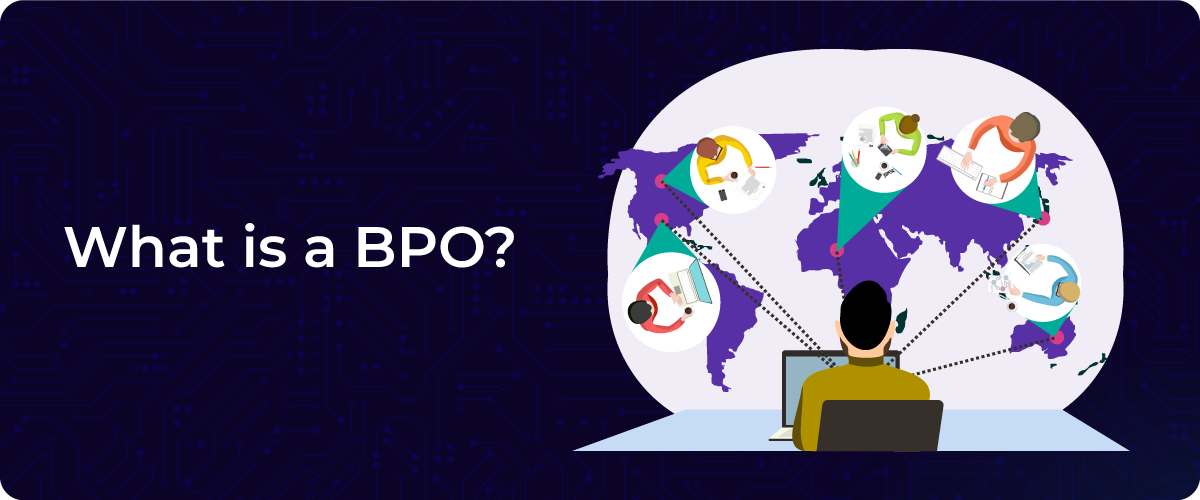
Defining Business Process Outsourcing (BPO)
Business Process Outsourcing, often referred to as BPO, is a strategic practice in which a business contracts specific non-core processes or functions to external service providers. These providers are experts in their respective domains, and by outsourcing tasks to them, businesses aim to streamline operations, cut costs, and enhance overall efficiency. BPO can encompass a wide range of functions, from customer support and data entry to financial services and human resources. The core principle is to leverage specialised skills and resources outside of the organisation to focus on core competencies and drive growth.
Key Takeaways
Outsourcing: Business Process Outsourcing (BPO) is a strategic practice wherein organisations delegate specific tasks or entire processes to third-party service providers. These providers are specialists in their respective fields, allowing businesses to leverage their expertise.
Efficiency: One of the core benefits of BPO is its potential to enhance operational efficiency. Outsourcing non-core functions to experts often leads to cost savings and improved process optimization.
Non-Core Functions: BPO commonly involves the outsourcing of non-core functions like customer support, data entry, payroll processing, and more. This delegation allows businesses to focus on their core competencies, such as product development and innovation.
Industry Relevance: BPO is a pervasive practice across various industries, including finance, healthcare, information technology, and customer service. This broad adoption highlights its adaptability and demonstrates how businesses across diverse sectors benefit from outsourcing.
Certainly, let’s provide more expansion on each section:
BPO Meaning and Context
Business Process Outsourcing (BPO) entails entrusting distinct business functions or processes to external service providers. This strategic shift allows organisations to allocate their resources more efficiently while reducing operational costs. BPO essentially means entrusting specialised service providers with non-core functions, allowing the organisation to focus on its core competencies. In today’s intensely competitive business landscape, BPO has evolved into an indispensable tool for cost management, operational excellence, and gaining a competitive edge. This practice isn’t limited to one industry or function but has become a versatile strategy applicable across diverse sectors.
The Evolution and Context of BPO
The evolution of BPO has been nothing short of remarkable. Initially, BPO was largely synonymous with call centres, which primarily handled customer service inquiries. However, as the business landscape evolved, so did the scope of BPO. It has grown from its call centre roots to encompass a multitude of industries and business functions. Today, BPO is recognized as a versatile and essential tool for optimising business processes and facilitating growth. This transformation reflects a growing recognition of the strategic advantages that outsourcing offers in an increasingly globalised and dynamic market. Businesses now turn to BPO not just for cost savings but as a means to enhance their agility, access specialised expertise, and drive innovation.
The Wider BPO Industry
The BPO industry extends far beyond the confines of customer service. It has expanded to encompass a diverse array of services, from data entry and finance to human resources and research. This broad spectrum of services demonstrates the adaptability of BPO providers in catering to the unique demands of businesses across a multitude of sectors. BPO has evolved into a one-stop-shop for organisations looking to streamline their operations and tap into specialised skills, irrespective of their industry.
BPO in Different Sectors (e.g., Real Estate)
In sectors such as real estate, BPO plays a pivotal role in various aspects of the business. These may include property management, data entry, and customer relationship management. By outsourcing these tasks to specialised BPO service providers, real estate companies can reallocate their resources more strategically. This strategic shift enables them to focus on core competencies, such as property acquisition, development, and client relationships. As a result, operational efficiency is enhanced, and the industry experiences accelerated growth.

Different Types of BPO Companies and Their Services
BPO service providers come in various forms, each specialising in different types of services. It’s essential to distinguish between BPO and call centres, as well as recognize specialised BPO companies catering to specific industries. Understanding these distinctions is fundamental when selecting the right partner to fulfil unique outsourcing needs. BPO service providers can range from large multinational corporations offering a wide array of services to niche players who excel in specific verticals.
Distinction Between BPO and Call Centers
While BPO encompasses a wide range of business processes, call centres represent a specialised subset of BPO. Call centres are primarily dedicated to handling customer inquiries and interactions, both inbound and outbound. This distinction is crucial when considering outsourcing options. While BPO can cover a gamut of processes, call centres are specialised in customer support and engagement.
Special Considerations in BPO Types
Different industries impose unique requirements on BPO solutions. For example, healthcare BPO demands strict adherence to data security and privacy regulations to safeguard sensitive patient information. On the other hand, financial BPO focuses on intricate financial processes like accounting, payroll, and risk management. Tailoring BPO to meet the specific requirements of an industry is paramount for the successful implementation of outsourcing strategies. It requires a deep understanding of the industry’s regulatory landscape, compliance standards, and operational nuances.
The Allure and Benefits of BPO
The appeal of BPO lies in its potential to transform businesses. Two significant benefits include the reduction of administrative overhead and the enhancement of business flexibility. These advantages make BPO an attractive option for companies striving to optimise their operations and maintain a competitive edge. Organisations see BPO as a strategic move to streamline their operations and achieve operational excellence while focusing on their core business functions.
Reducing Business Administration Through BPO
BPO service providers excel in streamlining administrative tasks such as data entry, payroll processing, and document management. By outsourcing these functions to experts, businesses can significantly reduce administrative overhead. This shift allows organisations to allocate resources more strategically and prioritise core objectives like innovation and growth. In essence, BPO transforms administrative overhead from a cost centre into a strategic enabler.
Enhancing Business Flexibility with BPO
One of the key advantages of BPO is its capacity to enhance business flexibility. BPO offers scalability, allowing companies to quickly adapt to changes in demand. Whether these fluctuations are seasonal or result from market dynamics, BPO provides the agility to respond without the need for extensive internal restructuring. This flexibility empowers businesses to remain responsive and competitive in dynamic markets, accommodating growth without impediments.

Potential Drawbacks of Business Process Outsourcing
While BPO offers numerous advantages, it’s prudent to acknowledge potential drawbacks and challenges. This section explores these concerns and provides insights into mitigating them effectively. BPO isn’t without its complexities, and businesses need to be prepared for potential challenges that can arise during implementation and operation.
Choosing the Right BPO Service Company
Selecting the appropriate BPO service provider is a critical decision. Factors such as reputation, expertise, security measures, cultural alignment, and scalability should be meticulously evaluated. This evaluation ensures the establishment of a successful outsourcing partnership aligned with the organisation’s business objectives. The right BPO partner should not only offer the required services but also be a strategic fit with the organisation’s goals and values.
BPO in Practice: Real-world Applications
This section delves into real-world examples that demonstrate how Business Process Outsourcing (BPO) is effectively applied in various industries. By examining practical applications, readers can gain a deeper appreciation of how BPO can be tailored to meet the unique needs of different sectors. For instance, it showcases how BPO can streamline customer support in e-commerce, handle a high volume of calls in telecommunications, or optimise supply chain operations in retail. By exploring these real-world scenarios, readers can grasp the versatility and adaptability of BPO across industries.
BPO Call Centers
BPO call centres are a shining example of how outsourcing can revolutionise customer service. These centres efficiently manage an extensive array of customer interactions, encompassing inquiries, complaints, technical support, and more. Industries where customer engagement is paramount, such as e-commerce, telecommunications, and retail, greatly benefit from BPO call centres. Through skilled professionals and advanced technologies, these centres enhance customer satisfaction, improve response times, and ultimately bolster brand reputation. This section delves into how BPO call centres operate and their significant role in delivering exceptional customer experiences.
BPO in Real Estate and Construction
Within the real estate and construction sectors, BPO serves as a valuable resource in optimising various aspects of the business. These applications may include property management, data handling, and customer relationship management. By outsourcing these functions to specialised service providers, real estate and construction companies can streamline their operations, reduce operational costs, and improve efficiency. BPO allows these organisations to direct their in-house resources towards core functions like project management, property development, and strengthening client relationships. This section highlights how BPO empowers these industries to achieve higher levels of efficiency and productivity.
Streamlining Business with BPO and Modern Software Solutions
Complementing BPO operations with modern software solutions plays a pivotal role in enhancing operational efficiency. This section explores how technology and software solutions are integrated into BPO processes, resulting in heightened productivity, increased accuracy, and streamlined communication. For instance, workflow automation tools reduce manual intervention, which leads to greater efficiency, reduced error rates, and improved scalability. The effective utilisation of these software solutions has become a defining characteristic of successful BPO partnerships, as they offer a competitive edge in delivering high-quality services while maintaining cost-effectiveness.
The Role of Software in Enhancing BPO Efficiency
Modern software solutions are essential in the BPO landscape, encompassing workflow automation, data analytics, and communication tools. These solutions substantially contribute to streamlining BPO operations by facilitating seamless communication, efficient data management, and precise performance tracking. Automation tools, in particular, enable the reduction of manual tasks, resulting in increased efficiency, lower error rates, and the capacity for easy scalability. The effective integration and utilisation of software solutions empower BPO service providers and organisations to elevate their efficiency, ultimately delivering greater value to clients.
The Future of BPO: Trends and Predictions
The BPO industry is dynamic and continually evolving to meet the evolving demands of the market. This section provides valuable insights into emerging trends and future predictions within the BPO landscape. Staying informed about these trends is vital for businesses to remain adaptable and competitive in the ever-changing realm of outsourcing. Some of the trends include the increased automation of processes, integration of artificial intelligence and machine learning, and the expansion of specialised services to cater to diverse business needs. Understanding these trends can help organisations strategically position themselves to harness the full potential of BPO in the years to come.
The Impact and Relevance of BPO in Today’s Business Landscape
In conclusion, BPO has emerged as a transformative force in the business world, offering a multitude of benefits to organisations seeking operational excellence and sustainable growth. Understanding its context, benefits, and potential challenges is essential for making informed decisions regarding outsourcing strategies. By strategically harnessing the power of BPO, businesses can gain a significant competitive advantage in the global marketplace. BPO is not merely a cost-saving measure but a strategic enabler that empowers organisations to thrive in today’s highly competitive business environment.
Unleash Your Contact Center’s Potential Today! 👉 Get Started with ConvoZen.AI and Elevate Customer Experience.
Schedule a Demo Now!
FAQs
Q1: What is Business Process Outsourcing (BPO)?
A1: Business Process Outsourcing (BPO) is a strategic practice where organisations delegate specific non-core business functions or processes to external service providers. These providers are specialists in their respective fields and deliver these services more efficiently, cost-effectively, and often at a higher quality, allowing the organisation to focus on its core competencies. This arrangement can encompass functions ranging from customer support and data entry to finance and accounting, thereby streamlining operations and boosting overall efficiency.
Q2: What are the primary advantages of BPO?
A2: BPO provides numerous advantages. It enhances operational efficiency by tapping into specialised skills and technologies. Cost savings are substantial as businesses can access skilled labour in locations with lower labour costs, reducing administrative overhead. Scalability allows quick adjustments to changing business needs, providing flexibility and adaptability. Moreover, outsourcing non-core functions lets companies concentrate on their primary objectives, such as product development, innovation, and market expansion.
Q3: What types of processes can be outsourced through BPO?
A3: Almost any process that doesn’t require a physical presence can be outsourced through BPO. Common processes include customer support, finance and accounting, human resources management, data entry, research and analytics, procurement, and supply chain management. Additionally, industries like healthcare and real estate also utilise BPO for tasks specific to their sector, such as medical billing and property management.
Q4: Are there specific industries that benefit most from BPO?
A4: BPO is versatile and applies to various industries. Finance and accounting BPO is prevalent in the finance sectors, while healthcare BPO involves medical billing and coding. IT outsourcing covers software development and tech support. Real estate BPO deals with property management and data entry. Virtually all industries can benefit from BPO, and the scope of applications continues to expand.
Q5: What’s the difference between BPO and call centres?
A5: BPO is a broader concept that includes various processes, while call centres are a subset dedicated to handling customer interactions. Call centres primarily deal with inbound and outbound customer calls, inquiries, and support. In contrast, BPO encompasses a wide range of functions beyond customer service, such as finance, human resources, and data management.
Q6: What are the challenges of implementing BPO?
A6: Challenges include data security and privacy concerns when handling sensitive information externally. Cultural differences between the outsourcing partner and the organisation can lead to misunderstandings, highlighting the importance of effective communication. Effective vendor management is essential to ensure service quality and adherence to contractual agreements.
Q7: How can I choose the right BPO service provider?
A7: Selecting the right provider involves evaluating their reputation, industry expertise, security measures, cultural alignment with your organisation, scalability options, and alignment with your business objectives. A clear understanding of your outsourcing needs is crucial. Additionally, consider visiting their facilities if possible, and seek client references to assess their track record.
Q8: What software tools are commonly used in BPO operations?
A8: BPO operations often rely on software tools for workflow automation, data analytics, customer relationship management (CRM), and communication management. These tools help streamline processes, enhance efficiency, and facilitate real-time tracking of service quality. CRM systems, for instance, enable seamless customer interaction, while workflow automation tools reduce manual intervention and improve task management.
Q9: What role does scalability play in BPO?
A9: Scalability is vital because it allows organisations to adapt quickly to changing demands. Whether facing seasonal fluctuations or market shifts, scalability ensures that operations remain efficient without extensive internal restructuring. BPO providers can rapidly allocate or reduce resources to meet your evolving needs, ensuring that services remain cost-effective and responsive.
Q10: How can BPO enhance customer service?
A10: BPO enhances customer service through specialised call centres that provide timely and efficient support. By handling a wide range of customer interactions, including inquiries, complaints, and technical support, BPO call centres improve response times, issue resolution rates, and overall customer satisfaction. This not only enhances the customer experience but also boosts brand reputation and loyalty.
Q11: Is BPO suitable for small businesses?
A11: Yes, BPO can be highly beneficial for small businesses. It provides access to specialised services and expertise that may not be affordable in-house. Small businesses can leverage BPO to reduce costs, improve efficiency, and compete effectively with larger competitors. Whether it’s outsourcing customer support, data entry, or accounting tasks, BPO allows smaller organisations to focus on core operations while still delivering quality services.
Q12: What are the potential risks of BPO?
A12: Risks include data breaches or leaks when sensitive information is handled externally. Loss of control over certain processes and potential variations in service quality can also be concerns. To mitigate these risks, businesses should implement stringent data security measures, maintain clear communication channels with outsourcing partners, and regularly assess service quality. Proper due diligence and selecting reputable BPO providers are key to risk management.
Q13: Can BPO be used for complex tasks like research and analytics?
A13: Absolutely, BPO providers offer specialised services for complex tasks like market research, data analytics, and competitive intelligence. These services leverage skilled professionals and advanced tools to deliver accurate and actionable insights. Outsourcing such tasks not only saves time and resources but also ensures that organisations have access to high-quality data-driven decision-making support.
Q14: How does BPO contribute to cost savings?
A14: BPO contributes to cost savings by reducing administrative overhead. Outsourcing tasks such as data entry, document management, and payroll processing allows organisations to allocate resources more efficiently. Cost savings can then be reinvested in core business activities, innovation, marketing, or further improving operational efficiency. It’s a strategic approach that optimises resource allocation while enhancing competitiveness.
Q15: What does the future hold for the BPO industry?
A15: The future of the BPO industry is dynamic and promising. It is expected to continue evolving with increased automation, integration of artificial intelligence (AI) and machine learning, and the expansion of specialised services to meet diverse business needs. BPO providers will play an even more strategic role in helping organisations adapt to a rapidly changing global business landscape. As technology advances, BPO will become more data-driven, enabling organisations to make more informed decisions and better serve their customers.


